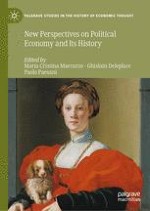2020 | OriginalPaper | Chapter
15. What Can Still Be Learnt from Sraffa’s Study of Prices in a Surplus Economy?
Author : Richard Arena
Published in: New Perspectives on Political Economy and Its History
Publisher: Springer International Publishing
Activate our intelligent search to find suitable subject content or patents.
Select sections of text to find matching patents with Artificial Intelligence. powered by
Select sections of text to find additional relevant content using AI-assisted search. powered by
